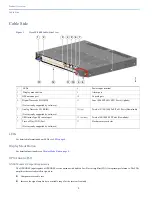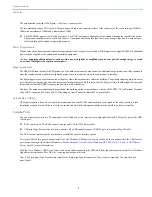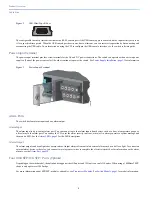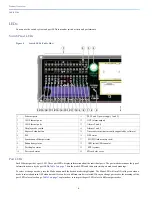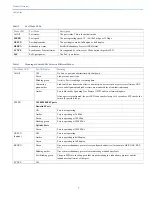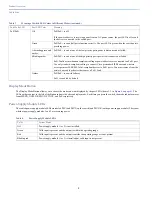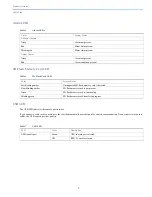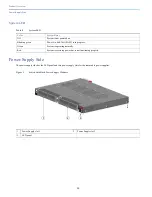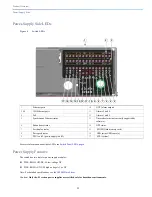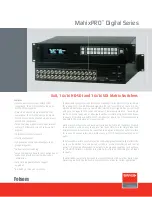
5
Product Overview
Cable Side
100/1000 SFP Ports (Downlinks)
The switch Ethernet SFP modules provide connections to other devices. These field-replaceable transceiver modules provide the downlink
interfaces. The IE 5000 supports both FE and GE optics in the downlinks. SFP modules have local connectors (LCs) for fiber-optic
connections or RJ-45 connectors for copper connections.
For the most up-to-date list of supported SFP models, see the
IE 5000 Data Sheet
.
For information about SFP modules, see your SFP module documentation and the
Installing and Removing SFP Modules, page 25
. For more
information about SFP/SFP+ modules and cables, see
Transceiver Modules
.
10/100/1000 PoE/PoE+ Ports (Downlinks)
You can set the 10/100/1000 ports on the switch to operate in any combination of half duplex, full duplex, or 10 or 100 Mb/s. You can set
the ports for speed and duplex autonegotiation. The default setting is autonegotiate.
When set for autonegotiation, the switch determines the speed and duplex settings of the attached device and advertises its own capabilities.
If the connected device also supports autonegotiation, the switch negotiates the best connection (the fastest line speed that both devices
support and full-duplex transmission if the attached device supports it) and configures itself accordingly. In all cases, the attached device
must be within 328 feet (100 meters).
Warning:
Voltages that present a shock hazard may exist on Power over Ethernet (PoE) circuits if interconnections are made using
uninsulated exposed metal contacts, conductors, or terminals. Avoid using such interconnection methods, unless the exposed metal
parts are located within a restricted access location and users and service people who are authorized within the restricted access
location are made aware of the hazard. A restricted access area can be accessed only through the use of a special tool, lock and key
or other means of security. Statement 1072
The 10/100/1000 PoE ports on the Cisco IE-5000 switches provide PoE support for devices that are compliant with IEEE 802.3af/802.3at.
The Cisco prestandard PoE is also supported for Cisco IP Phones and Cisco Aironet Access Points. The PoE ports on the switch deliver up
to 30 W of PoE+ power. All twelve ports are PoE ports and can be assigned a port priority.
When both power-supply modules are installed, the system has enough power to support all twelve ports as PoE ports. The maximum
available PoE power is 185W.
With one power module installed, the maximum available PoE power is 65W. In case one power-supply modules fails, the power to the low
priority PoE ports is dropped, while power to the high priority PoE ports remains uninterrupted.
On a per-port basis, you control whether or not a port automatically provides power when an IP phone or an access point is connected.
The 10/100/1000 PoE ports use RJ-45 connectors with Ethernet pinouts. The maximum cable length is 328 feet (100 meters). The
100BASE-TX and 1000BASE-T traffic requires CA5, CAT5e, or CAT6 unshielded twisted pair (UTP) cable. The 10BASE-T traffic can
use CAT3 or CAT4 UTP cable.
For information about configuring and monitoring PoE ports, see the switch software configuration guide on Cisco.com.
For information about port connections and port specifications, see
Connecting Devices to the Ethernet Ports, page 30
.
Note:
The output of the PoE circuit has been evaluated as a Limited Power Source (LPS) per IEC 60950-1.
SD Flash Memory Card
The switch supports a flash memory card that makes it possible to replace a failed switch without reconfiguring the new switch. The slot
for the flash memory card is on the front of the switch. The flash card is hot swappable and can be accessed on the front panel in non
hazardous locations only. A cover protects the flash card and holds the card firmly in place. The cover is hinged and closed with a captive
screw. This prevents the card from coming loose and protects against shock and vibration.
For more information on inserting and removing the flash memory card, see
Power-Supply Side, page 10
.


